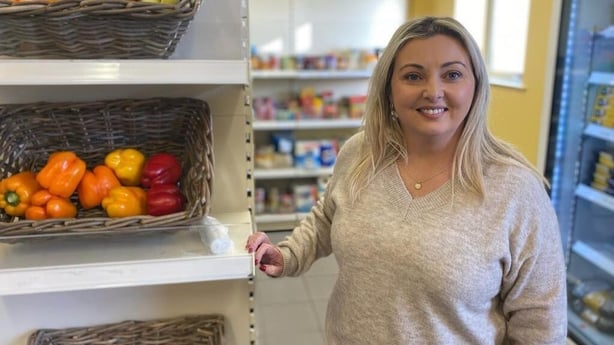As the new year began with the deadlock at Stormont still unresolved, people in Northern Ireland have now been living without a functioning executive for almost two years.
The Stormont institutions were suspended because of a DUP boycott in protest at post-Brexit trading arrangements.
It means senior civil servants are left in charge of government departments in Northern Ireland, but due to an absence of ministers, they are restricted in decision-making powers.
As the stalemate continues, what issues are shaping people's lives?
Colin Torrens, principal of Lisnagelvin Primary School in Derry, has worked in education for 31 years and says the system in Northern Ireland is "crumbling".

He says while there were funding issues before the collapse of Stormont, they have now been exacerbated.
"What we're seeing now is a backlog of catastrophes," he said.
"School leaders, teachers, classroom assistants, they papered over the cracks for the government. They tried to make things work so the children wouldn’t suffer. We’ve got to the stage now where that’s just no longer possible."
On 18 January, teachers are due to join what is expected to be one of the biggest public sector strikes in Northern Ireland’s recent history.
Teachers in Northern Ireland have not had a pay increase for almost three years, while their counterparts in England, Scotland and Wales can earn thousands of pounds more at the same grade.
Mr Torrens wants either the institutions at Stormont to be restored, or the UK government to intervene.
"Do something now, get our country back on its feet. Give our children the education they deserve, because they are going to be our doctors, nurses and teachers of the future, and right now we are failing them."
We need your consent to load this rte-player contentWe use rte-player to manage extra content that can set cookies on your device and collect data about your activity. Please review their details and accept them to load the content.Manage Preferences
Dr Tom Black is a GP in Derry and is chair of the Northern Ireland branch of the British Medical Association.
Under the NHS system, GP services are free for patients, but Dr Black’s practice has now started to offer private appointments alongside this work.
He said he had no choice but to implement this model as the practice would risk becoming bankrupt in months.
Doctors there will now see patients during evenings or lunchtimes, in addition to their NHS patient list.
"We charge a fee of £75 per consultation, and that goes into the bank account to pay for the NHS practice," he said.
"We’re not paying the doctors to do this work, they do it for free, we do it to keep the other practice running."
"For me, a doctor of 40 years working in the NHS who has never done any private practice, it’s embarrassing. I shouldn’t have to do this, but to be blunt, we have incompetent politics."
Dr Black thinks a functioning executive at Stormont will not fix the health system, but could help.
"The problem we have is the waiting lists, and the lack of funding, and the lack of workforce."
Hospital waiting lists in Northern Ireland are the worst in the UK.
"It’s a shambles, a service pretending to be a service," he said. "It’s embarrassing to have to say no to my patients all day long."

Una Hegarty, from Magherafelt in Co Derry, has two children, aged five and three. With a full-time job in construction management, she sends the children to crèche two days a week. She has reduced her working days and can work from home one day per week.
Even though crèche is only two days per week, the childcare bill can come to £900 per month.
Ms Hegarty said this expense, along with other rising costs like mortgages, means families in Northern Ireland are coming under financial pressure.
She worries more parents may have to leave work as they cannot afford childcare.
Free childcare support has been expanded in England, but as childcare is a devolved matter, similar supports cannot be expanded to families living in Northern Ireland.
"It’s very frustrating," said Ms Hegarty. "It’s very difficult for working parents to make ends meet, and there seems to be no end in sight, especially with the way the NI executive is at the minute."
"I’m expected to be at my work every day. I expect them to be at their work every day. We deserve the same as the rest of the UK is getting. We need help."
"I think there’s going to be massive trouble if parents can’t get some sort of aid to try and help them raising families."

Karen Mullan is the manager of Foyle Food Bank and a former Sinn Féin MLA. She said rising financial pressures have resulted in a change in the demographic of people seeking their assistance.
"More people, larger families, more working people," she said. "It’s devastating for many people who’ve had to come here and reach out for our help."
She said many people coming to them are in debt from using credit cards to pay heating bills last winter.
"We do have some two income households coming, and they certainly should be getting paid a decent enough wage to meet the essentials."
Last March, Northern Ireland’s Department of Education scrapped the school holiday food grant to save money. The grant helped the families of pupils entitled to free school meals with the cost of feeding them during school holidays.
Ms Mullan said this meant the food bank saw a steady increase in demand throughout last summer.
"People have been forgotten about, and left behind by all governments," she said.
"Everybody needs to be working together. They need to be tuned in and aware of how difficult it is for people out there."







